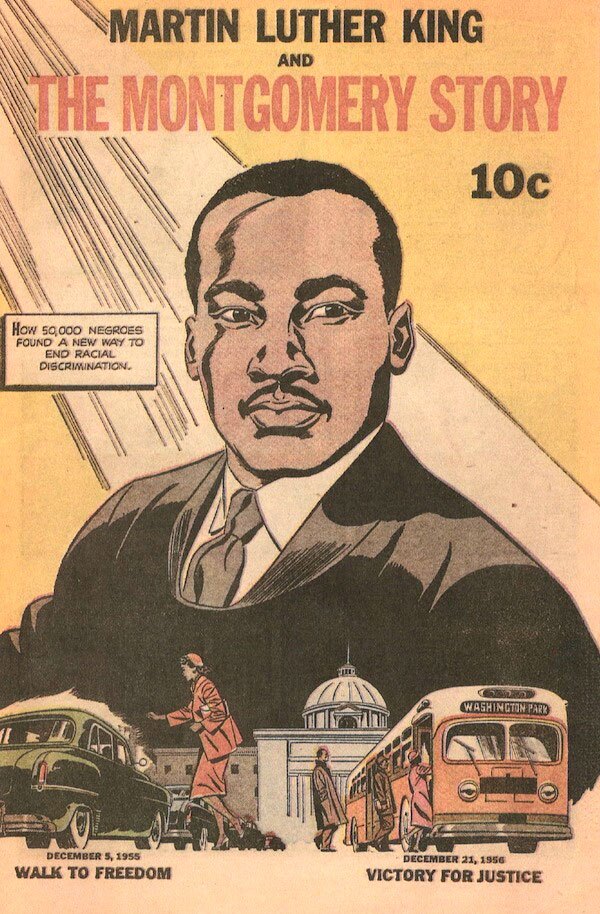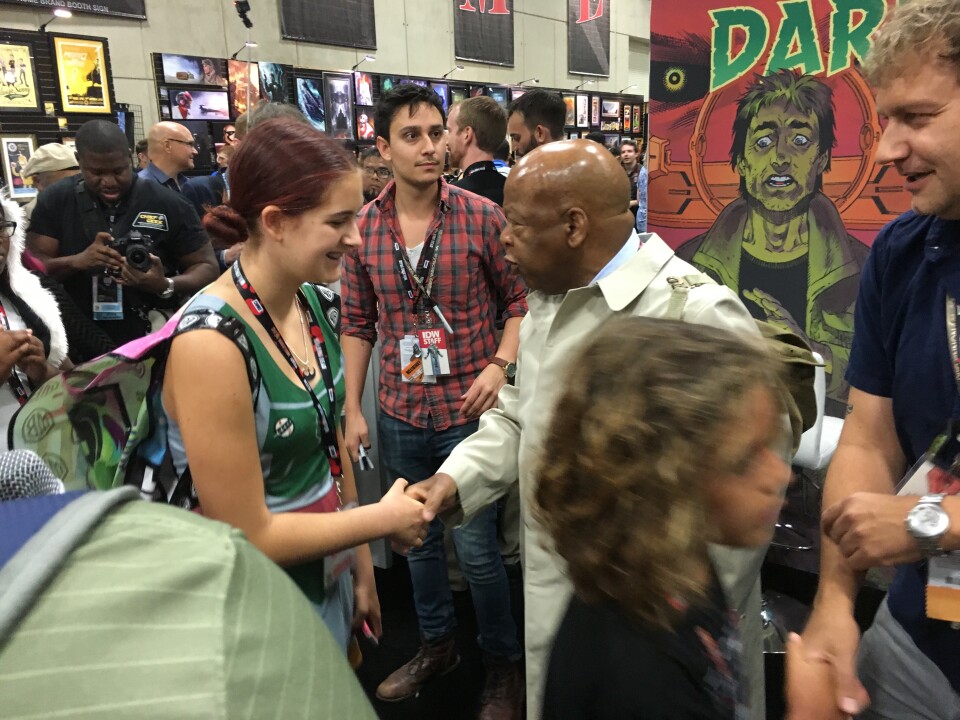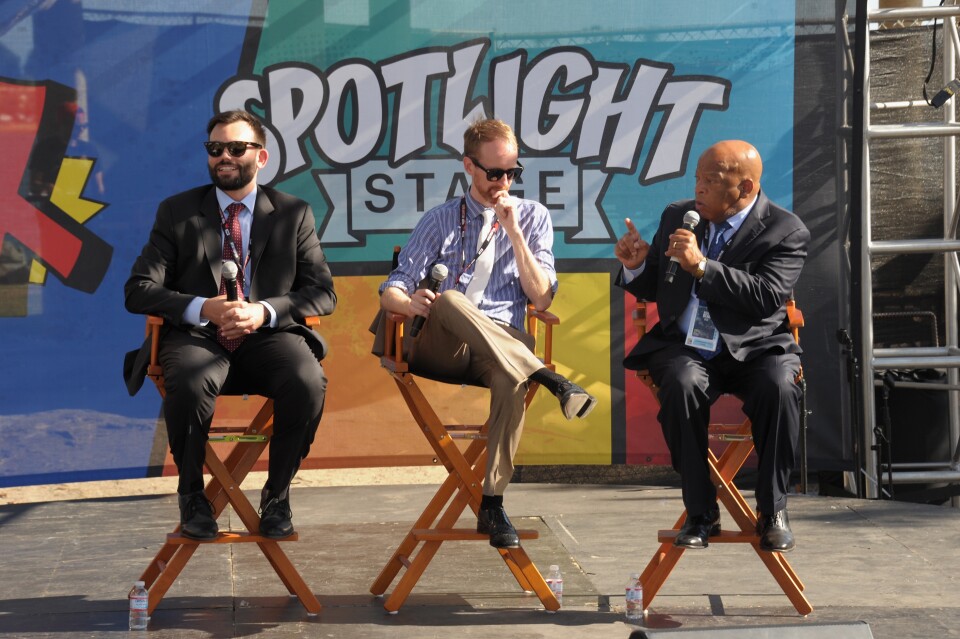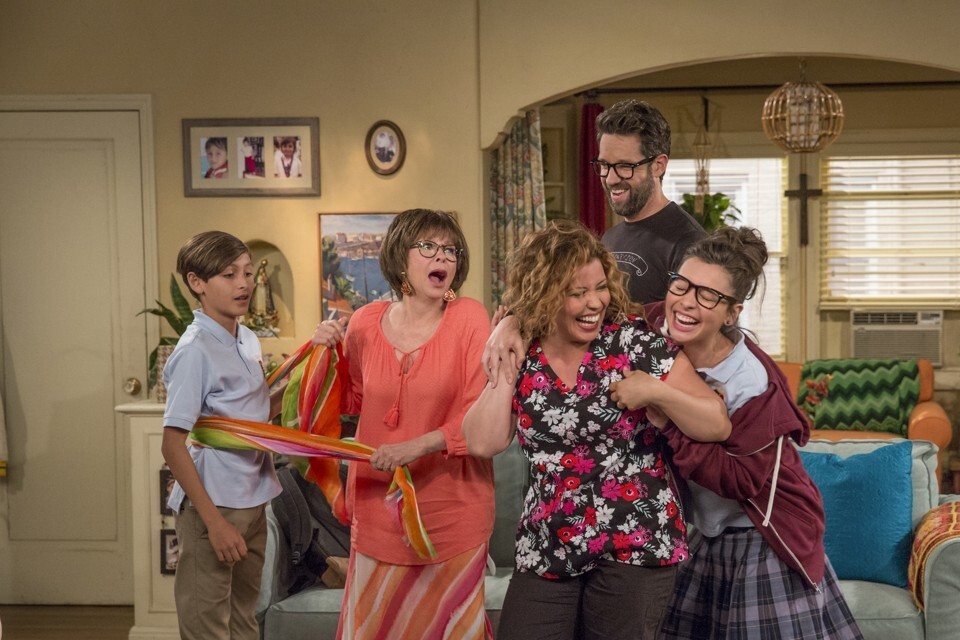After John Lewis was criticized by President-elect Donald Trump, the Congressman's grahic novel trilogy about the Civil Rights Movement shot to the top of Amazon's best-seller list; Netflix has a new version of the Norman Lear sitcom that puts a 21st Century spin on matters.
Rep. John Lewis' spat with Trump reminds the nation of his civil rights legacy
We revisit our interview from last summer with Congressman John Lewis after a recent spat with President-elect Donald Trump. When the Congressman announced he would not attend Trump’s inauguration, Trump responded with a series of tweets in which he questioned Lewis’ legacy, and inaccurately described Lewis’ district as poverty-ridden.
John Horn interviewed Lewis at Comic-Con 2016 in San Diego where the Congressman was introducing the third part of his graphic novel trilogy, “March.” A few months later, it would become the first graphic novel to win the National Book Award for Young People’s Literature.
How can the youth of today understand the civil rights movement and carry it forward? Civil Rights pioneer and Congressman John Lewis thinks his series of graphic novels, "March," can help.
These books are history but are also a guide. It's a manual to teach and also to inspire. To get young people and people-not-so-young to stand up, speak up and speak out, and find a way to get in the way. To get in, what I call, "good trouble." You see something that's not right, not fair, not just, and you have a moral obligation to do something, to say something and not be quiet. You need to make some noise.
The 76-year-old representative from Georgia has a long and distinguished record in civil rights. He was chairman of the Student Nonviolent Coordinating Committee, better known as SNCC. As part of Mississippi Freedom Summer, Lewis helped lead the effort to register black voters, and was one of the organizers of the Selma-to-Montgomery marches, where in 1965 he and many others were savagely beaten by Alabama state troopers.
Lewis co-authored the "March" series with Andrew Aydin, who also serves as Digital Director and Policy Advisor to the Congressman. The trilogy is illustrated by Nate Powell, whose images depict many of the horrifying events from the civil rights movement, and also celebrate its greatest victories, like the signing of the Voting Rights Acts. The second installment won an Eisner Award for best reality-based work. The third and final book in the series was introduced at Comic-Con 2016.
The Frame's John Horn met with John Lewis, Andrew Aydin and Nate Powell at a San Diego hotel, just steps from Comic-Con prior to their presentation at the convention.
Interview Highlights:
You were only 17 when the 1957 comic, “Martin Luther King and the Montgomery Story,” was published. What did reading that book do for you?
Lewis: I was very inspired by this. I'd heard of Martin Luther King Jr., heard of Rosa Parks. It said to me, If Martin Luther King Jr. and Rosa Parks and others can believe in and accept a way of peace, the way of love, the way of nonviolence, then I too could do something. It made me the person that I am today.

You've co-written these graphic novels — although its not really a novel because it's a true story. What are you able to do in this format that you're not able to do in a memoir?
Lewis: I believe in this format. You are able to make it real, make it plain, make it simple for young people and people not so young to understand. It's drama— high drama. That's what the civil rights movement was all about — drama.
A lot of people, and especially young people, may not fully understand what actually happened during the civil rights movement. How does a book like this change their understanding of what happened? And how does the presentation of a comic affect an audience in ways that a documentary or a book or a movie like "Selma" can't?
Lewis: The writing ability and capacity of Andrew Aydin, the co-author, and the ability of Nate Powell, the artist, make it so real. It tells us, the reader, what happened and how it happened. You can see us sitting down at lunch counter stools and people spitting on us, pouring hot water on us, hot coffee. And we're so orderly and so peaceful and we get arrested and go to jail. It tells stories that are powerful. Just a group of young people, of college students coming together believing in the way of peace, the way of love and the way of nonviolence as a way of living.

Andrew and Nate, how do you see comics as an effective medium for communicating John's story?
Aydin: Comics, I think, are incredibly important right now because of the Internet. The visual literacy that the Internet requires makes comics the language of this generation. If we want to speak with them, we have to speak with them in their language.
Congressman Lewis, do the illustrations in this book trigger memories of things that maybe you had forgotten? Do you start reliving the period by researching it?
Lewis: At times, I had to lay the book aside because I had become very emotional. To re-live what happened in Selma when we tried to walk across the bridge, I kept saying to myself, How could human beings treat their fellow human beings the way we were treated? We had a constitutional right to march in an orderly, peaceful, nonviolent fashion.
To re-live the three murders of civil rights workers in Mississippi or to go to the church in Birmingham for a few hours after the church was bombed and to attend the funeral of the four little girls — you have to relive all of that. It's almost too much.
Congressman Lewis, does it almost feel that even though these books as a trilogy are completed that there's a whole other series of books you could start writing now?
Lewis: I think the climate and the environment and what is happening in America and around the world, I think you could start writing another series.

Your collaborators are nodding in agreement. Do you guys already have plans for how you can pick up the story?
Powell: Generally speaking, one of the biggest considerations, about halfway through making the "March" trilogy, was exactly where we bring it to a close. The end of "March 3" covers what Congressman Lewis considers the end of the movement as he knew it. It does not mean that the work was done or that the movement in a broader sense was done. It expanded and changed fronts. There was enough content in the next few years after, in the late '60s, that we didn't know if that was going to be a long epilogue or a fourth book or exist outside the trilogy. For now, we decided that in a narrative sense the trilogy needs to be self-contained here as an idea, but we always want to emphasize that by no means does that mean that it's this unilateral victory or that the book itself is closed or that it's ever closed.
Aydin: It's dedicated to the past and the future of the movement. For me, seeing Congressman Lewis, he becomes an infectious force in your life. My father was a Muslim immigrant and I never knew him very well. My mother all my life was insistent that I shave. She never wanted me to have a beard or facial hair because she thought it would make me look more Muslim. I was raised Methodist, but, because of my father, she was very sensitive to that. When the Republican nominee started saying all of this stuff and wanting to register Muslims, I grew my beard out because I work on Capitol Hill and I want every one of my colleagues and every one of the members of Congress who sympathizes and empathizes with that position to know who they're talking about and what it is they really are saying to America.
For me, I've heard them say, honestly, It's okay, you're one of the good ones. That's completely unacceptable. So we have to use nonviolence not just as a tool and tactic, but as a way of life and a way of living. We are all trying to do that through "March" as well.
The "March" trilogy was published by Top Shelf Productions. Book 3 will be available in August, 2016.
'One Day at a Time' remake is as progressive as the original
Gloria Calderón Kellett and Mike Royce are co-creators and producers of Netflix’s remake of the Norman Lear sitcom, “One Day at a Time,” which originally aired in the 1970’s and 80’s.
The new version of the show is getting more than a few updates. For one thing, the family is now Cuban-American. Along with the addition of an immigrant grandmother, played by Rita Moreno, this change allowed Calderón Kellett and Royce to include serious conversations about immigration policy throughout the show's first season.
But the new "One Day at a Time" also takes on other topical subjects, including PTSD among veterans, sexism in the workplace, and the challenges facing LGBTQ youth.
Royce and Calderón Kellett joined the Frame's John Horn in studio to talk about the challenge of remaking "One Day at at Time" without losing the spirit of the original show.
Interview Highlights:
On the show's knack for tackling tough subjects:
Calderón Kellett: Norman [Lear] tells a story about how they wanted Mary Tyler Moore to be divorced and the network would not allow it. So really, [the original "One Day at a Time"] was the first time there was a divorced woman on television and raising children by herself. That was, at the time, very groundbreaking. I think what's daunting about doing anything from Norman's canon is that he did everything pretty amazing. So how do you redo something that was already pretty terrific?
On Norman Lear giving her creative license with the show:
Calderón Kellett: When I met with him, he asked me to talk about my family and so I did. It's now very kind of in vogue, Latinos, but it's all I've known. But the interest has been coming the last few years and it's something that I've been very protective of because I have other comedian friends or writer friends that have written about their own family, not even necessarily just Latinos. Things get messed with along the way and unless you have a very clear voice and people supporting you, it can be a scary thing to do. And I adore my family. They come to the show every week and so I wanted to make sure to do it right. So certainly in that meeting with Norman, he made me feel very comfortable and I felt very confident that he was going to allow me to be unfiltered.
On what about the show is and isn't unique to her background:
Calderón Kellett: Just specificity, really. I don't think my family is that different than other people's families. But there is a warmth and we are up in each other's grill a lot. I see my parents every day and my dad will text me if I don't reply in an hour. It's like, Are you dead? Qué paso? I'm like, Dad, I just saw you. We're just up in each other's lives a lot, but that's not specific to Latinos.
I'm Cuban. That's how I grew up. My parents came here not knowing any English. I am the child of immigrants and this is what I sound like. A lot of people don't identify me off the street as being Latina, even though I'm a hundred-percent Latina. So I think to be seen in that way and to be able to share that experience and have people not only hear, but lift you up, is pretty incredible.

On how Royce contributes to the show being non-Latino:
Royce: What started percolating in my head when I met with Norman was teenagers. I have teenagers. And the single mom was a big part of the original "One Day At a Time." I've been fortunate in the past to do some shows that I related to, but I've never been able to do a show that directly took stuff from my own family or at least was inspired by. I think that is where I really started to relate to it. The pilot episode is about the daughter not wanting to have a quinceañera. While I'm not Cuban, my daughter, if she was Cuban, would have not wanted to have a quinceañera for the exact same reasons that Gloria did not. That's why we took that story and made it part of the pilot.
On using the show to talk about larger issues:
Calderón Kellett: The Cuban experience in the country is harrowing. What these kids went through was harrowing. So I don't want to take away from that experience because what they went through no one should have to. It's something my family wears very much on their sleeve. My mom still can't talk about Cuba without bursting into tears — and it was 40 years ago. So I don't want to take away from that, but I also feel like they had the opportunity to follow the rules and not everyone does. Certainly, living in California and having so many friends that are different types of Latinos, this was a conversation that I would have with them and I'm so grateful that my parents are open listeners. They have their convictions, but I've always been allowed to talk about things and in talking about them, we both come to a better understanding.
On casting the writers room:
Royce: We just read a lot of people. When you're staffing, what happens is you put out a call to all the agents and they give you submissions. So the thing we said was, We need Latinos, we need women and diversity across the board. Please send us that. You have to say that because you will be avalanched with white guys.
Calderón Kellett: Some agencies are doing a great job of trying to do that, but there were places that sent one person or two people because that's all they had. We love our room, but a lot of it came from a lot of reading, a lot of poking around and finding people.
Royce: The talent pool is out there, but you also have to help the talent pool. You have to grow these people. You have to make the effort. So it's trying to keep a lot of balls in the air and it's really incumbent on show runners to do that.




